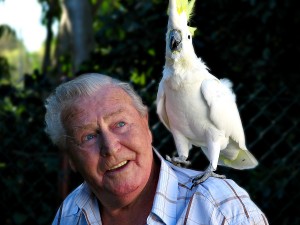In last week’s post about meeting a “celebrity” pastor, I mentioned the demeaning experience of speaking to someone who seems to have more interest in our shoulder than our eyes. Did a parrot land there when I wasn’t looking?

Eventually, painfully, you realize that your “conversational partner” is simply looking over your shoulder for someone more interesting or important to talk to! Ouch!!
Quite a few of you identified with this heart-sinking, ego-shrinking feeling, and even suggested that pastors were some of the worst culprits!
Being fully present
Some of this pastoral “over-the-shoulder” conversation is understandable. Post-preaching, we often have people waiting to chat, ask questions, etc. There are others with acute needs that we want to talk to. Then there are visitors that we want to welcome and say a few words to. It’s very tempting to keep looking beyond the person before us, to make sure that we don’t miss anyone.
However, in a recent Fastcompany article on conversational distractions, Olivia Cabane argued that if we want to leave a deep impression on people (she calls it being “charismatic”) we must try harder to stop our minds from wandering while one-on-one:
Charismatic behavior can be broken down into three core elements: presence, power, and warmth. These elements depend both on our conscious behaviors and on factors we don’t consciously control. People pick up on messages we often don’t even realize we’re sending through small changes in our body language.
In order to be charismatic, we need to choose mental states that make our body language, words, and behaviors flow together and express the three core elements of charisma. And presence is the foundation for everything else.
We may think that people don’t notice our slightly delayed reactions or distant looks but body-language scientists tell us micro-facial expressions still appear, and even if they’re as short as 17-32 milliseconds, people detect them.
So, we cannot fake presence; what’s in our minds shows on our faces. Some of us have wives that can detect our “distance” in much less than 17 milliseconds! “Helllooo, David. Anybody in there?”
Although, Olivia says that presence “is a learnable skill that can be improved with practice and patience,” her proposed method seems a bit weird to me.
Three ideas
Here are my ideas. First, love the person in front of you rather than the one behind them. This person has a soul, a valuable soul, a needy soul, a soul that we must give an account for to God. Let’s love them with all our hearts (and both of our eyes) for these few minutes.
Second, trust God’s sovereignty. God put this particular person in your way for a reason; find out the reason. Also, trust God with the people passing by; if God means you to talk with them, then He will make it happen. Better one or two worthwhile conversations than lots of smalltalk.
Third, develop an ability to gently end a conversation after a reasonable period of time. Sometimes offering to briefly pray with a person can provide a natural stop-point. Or offer to phone or visit soon and talk further. Or ask an elder to “rescue” you if he sees anyone dominating your time.
Any other suggestions?